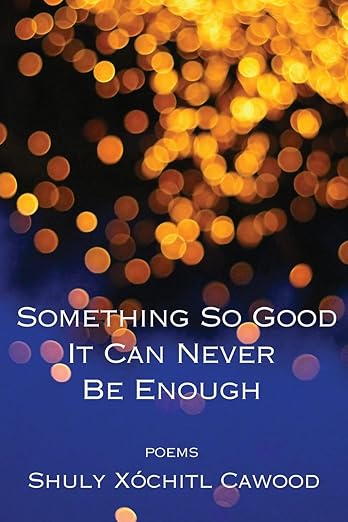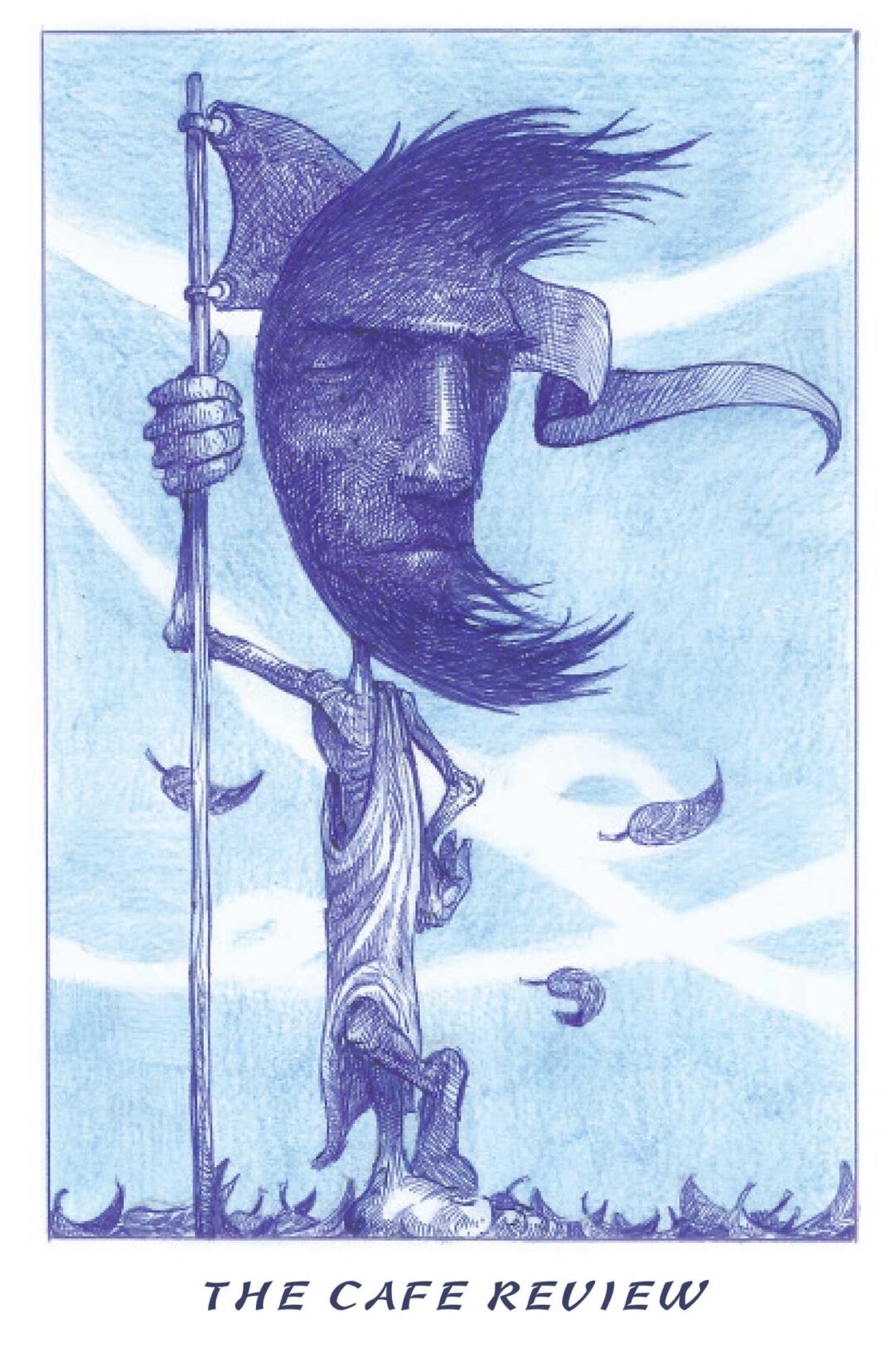Something So Good It Can Never Be Enough

Something So Good It Can Never Be Enough, Shuly Xóchitil Cawood.
2023, 72 pages, paper, $17.95,
ISBN: 978–1–950913–66–9
Ostensibly, the “something so good” referenced in the title is buttermilk rolls. In the poem “My Mother’s One Request,” the speaker (presumably the author) started making them from a recipe at age 15. Her mother loved those rolls, couldn’t get enough, asked her daughter to make them many times, though the process was slow. The daughter, now busy, “tired of the recipe and its need // for each long rise” eventually stops making her mother’s favorite bread. Whether the author feels a twinge of guilt about stopping the flow of rolls is not clear, but the poem comes across as a warning that whenever you create an insatiable demand for something, cutting off the supply can have unfortunate consequences.
The poem is one of several in this collection about cooking and mother–daughter relationships. Another is the prose poem, “My Mother Says She Does Not Know How to Cook,” which begins:
“How did you make this?” she always asks. “A recipe,” I tell
her. No magic trick. No
skill. Just buying ingredients, following directions, not varying
from what I’m supposed
to do. My mother looks in her fridge and pulls out vegetables,
slices them, Even keeps
the stems, sautés them, adds an egg, adds some rice, and what
about that can of water
chestnuts, that might be good, and is there a tomato in the
garden? Oh there’s cilantro out
there, let’s try that.
The notion never occurred to me, until now, that one’s cooking habits might warrant more attention from behavioral scientists. Is the practice of following or not following a recipe predictive of one’s need for structure, variety, lists, schedules, or even love? We don’t know yet. But this poem does something else. It segues into a daughter’s praise for her mother, irrespective of their personality differences. The mother was an immigrant from Mexico, overcame many obstacles and “measured people by their honesty and kindness, not their good or money, not their empty promises. . . .”
A multi–genre writer with published short stories and essay collections, Cawood does not stick to a particular poetic form or style. Some of the poems are prose poems. Most are lineated. Some have short lines, others long expansive lines. Her style is closer to Whitman than Dickinson. She works in conversational language and illuminates nuances of tension and conflict between people. Open about her life, problems, and struggles, she encourages us to ruminate on her own.
Cawood ranges over many subjects, including love, marriage, divorce, beauty, and friendship. My favorite piece in this book is “A Working Definition of Yes,” a poem that makes me want to make a list of all the things I want to say yes to. Here are a few representative lines:
It’s your ruffled red dress. . . .
It’s an investment in hope, expecting more over less . . .
It’s the arrest of a villain. . . .
It’s the hatching of eggs and the mess of dirty dishes
you leave in a heap. . . .
The poem wraps up beautifully with
Yes, is everywhere —
Like fireflies and silver leaves and dogs that chase the rain.
Like dandelion seeds blowing in summer backyard. Like all
those stars behind every cloud you ever saw. Yes is without
regret,
without regard.
— Richard Allen Taylor
immortality

By Jacob Friesenhahn
the snowy banks of the river shifted
causing the abandoned cemetery
beyond the woods to erode
coffins unearthed
bobbing to the surface
appearing oddly light
tombstones pulled away
like baby teeth
drawn into the current
the puzzle of gravestones
separated from the tombs
they once pretended to mark
skeletons floating in sleek boats
down a river not supposed to be here
stones etched with letters and numbers
like the veins of fallen leaves
slipping under the icy water
the living were unnerved
the dead could only laugh
Where I Live

By Twyla M. Hansen
Before daybreak, you may find me bundled
against wind, following the tracks of paws
on a crust of snow past the seesaw, trunks,
past the stalks of tall sumac, past the swings,
and the playhouse to the pile where I fling
bread crusts, egg shells, left–over triangles
of pizza, feed the hunger of creatures
when night falls — fox, raccoon, opossum — or
in sun, stray deer and things with feathers, spring
dreams below the horizon.
You may find
me gazing skyward in navy air at
clusters of stars, the planets, and, with luck,
the crisp lemon–slice moon, breathing damp air,
winter heaving from under fallen leaves.
And at daybreak you may find me looking
out to children who no longer play here,
who dwell elsewhere.
I smile now at the flame
of those shadows, watch instead for red–tails
on bare limbs, running Vs of geese over
the meadow, praise the goddess of beauty
who taught me to love this place where I live.
Road Music With Trees in Spring: Quatrina

By Twyla M. Hansen
Through mist we scan along fences and trees
for hawks, tallying them, game on the road
to pass the time — that, and the rock music
that blasts out loud, pushes us closer to spring.
They eye us from posts, signs, limbs of scrub trees:
the red–tailed hawks returning in near–spring.
They lift and loop in the sky’s blue. The road
curves along. We sing out loud to music.
Years before, the game was slug–bug on road
trips with our young son and his loud music,
the miles flying, his face fresh, hawks and trees
blurred. The season always seemed to be spring.
Now in autumn, I travel the lone roads
through trees. My grown son is still all music.


